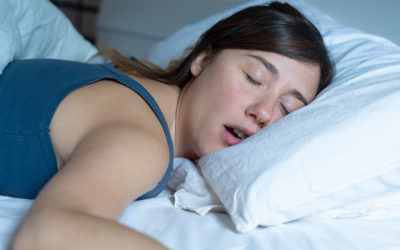Sleep Apnea
Sleep Apnea: Effects, Signs & Treatment
Getting enough sleep is essential for maintaining good health. Unfortunately for many, getting a full night’s rest is a luxury – an estimated 22 million people in the U.S. suffer from sleep apnea, according to the American Sleep Apnea Association.
Sleep apnea has been linked to diabetes, heart disease, obesity and depression, according to the Centers for Disease Control and Prevention.
Characterized by repetitive pauses in breathing during sleep, sleep apnea occurs when the tissue at the back of the throat between the mouth and lungs briefly collapses and causes breathing to stop momentarily. With each apnea event, the brain and body become oxygen deprived and may wake the sleeper. This can happen hundreds of times a night and result in excessive daytime sleepiness.
Due to airway blockage, signs of sleep apnea include frequent loud snoring and gasping for air during sleep. Individuals with sleep apnea generally feel fatigued, have difficulty concentrating or may unintentionally fall asleep during the day. Fortunately, the disorder can be addressed through healthy lifestyle changes or a range of medical treatments. Follow these simple steps to prevent sleep apnea:
- Maintain a healthy weight. One of the most common triggers of sleep apnea is being overweight or obese. To maintain a heathy weight, try to eat a balanced diet and work your way up to 150 minutes of exercise per week as recommended by the Office of Disease Prevention and Health Promotion.
- Quit smoking and avoid excessive alcohol consumption. Smoking can increase swelling in the upper airway, which worsens snoring and apnea. Because alcohol relaxes the throat muscles, it’s best to avoid consuming excessive amounts which can cause you to snore heavily or your airway to collapse.
- Avoid sleeping on your back. Gravitational force causes the jaw, tongue and soft palate to drop towards the throat and restricts breathing.
Eighty percent of sleep apnea cases are undiagnosed. If you think you may have sleep apnea, make sure to see your doctor. A physician can recommend treatment options for you or refer you to a sleep specialist. Treatment options depend on severity, but the most common treatments include:
- Mouthpieces. Custom-fit devices which keep the airway open while you sleep. When the mouthpiece is in, the jaw is held in a position to prevent it from blocking the upper airway. Your doctor may recommend this treatment option if you have mild sleep apnea.
- Breathing devices. Continuous Positive Airway Pressure (CPAP) machine is a breathing device worn over the nose and mouth during sleep. The mask or other device is connected to a tube and delivers a continuous flow of air into the nose.
- Surgical procedures. If you have enlarged tonsils, a small lower jaw with an overbite or a deviated nasal septum, surgery may be required to address sleep apnea. Possible surgical procedures include tonsillectomy, maxillary or jaw advancement and tracheostomy. Talk to your doctor about the different types of surgical procedures to determine what option is best for you.
If you think sleep apnea maybe a reason for your sleepless nights, contact your Gateway Medical Group primary care provider at 618.798.9587 and ask about your options.
Schedule a Consultation
Call 618-798-3400
Related Services and Conditions
Sleep Center
It’s normal to have trouble falling and staying asleep now and then, but chronic sleeplessness can be a serious health issue. If you are experiencing a sleep disorder such as insomnia, sleep apnea, narcolepsy or restless leg syndrome, the sleep specialists at Gateway...
Sleep Study
You Deserve a Good Night’s Sleep Are you having problems falling asleep, staying asleep or even staying awake and alert during daily tasks? Your primary care physician may refer you to Gateway Regional Medical Center’s Sleep Center for a comprehensive evaluation of...


